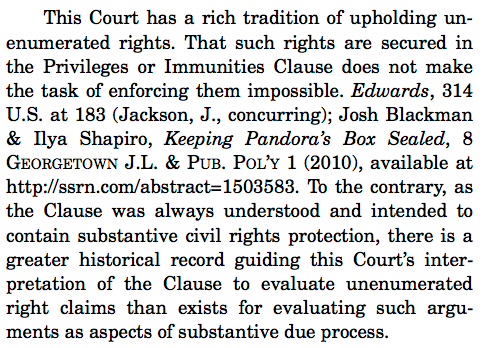I just finished reading through Petitioner’s Reply Brief in McDonald v. City of Chicago. I think Gura made a compelling argument to support incorporation under either due process or privileges or immunities, though as Gura consistently repeats, privileges or immunities is the better way. I also think he highlighted many of the weaknesses in Chicago’s brief, and highlights that the respondent’s arguments are mostly policy, and not legal bases.
One important thing to note about the NRA’s brief is they fail to adequately brief the due process argument. They don’t focus on Palko, Benton, Duncan, and Glucksberg. Most surprisingly, they do not even cite to Judge O’Scannlain’s opinion in Nordyke v. King, a case that incorporated the 2nd amendment through the due process clause. Very surprising for a group that thinks Gura won’t argue due process.
At Volokh, Orin Kerr focused on one passage, and considered it an unusual argument
NRA’s novel theory, at 40, that Cruikshank did not bar the Second Amendment’s application to the States, contradicts over a century of understanding. See, e.g., Heller, 128 S. Ct. at 2813 (“States, we said, were free to restrict or protect the right under their police powers”). Erroneous precedent should be overruled, not tortured further to achieve politically desirable results.
Kerr remarked:
I understand that there is a lot of bad blood between the Petitioners and the NRA. And I have no opinion of the NRA’s argument, not having read its brief. Still, it’s rather unusual to see a passage in a legal brief asking a court not to accept an argument in its favor.
From the outset, Gura has maintained that incorporation of the 2nd Amendment, while maintaining the Slaughterhouse-Cruickshank-Presser line of precedents, makes the right to arms very week. In other words, even if the right is incorporated, but Cruickshank et al are still good law, in all likelihood, the Chicago gun ban would stand. What good is incorporation if the most draconian ban in the country can remain?
Once you understand this point, contrary to Kerr’s remark, Gura’s strategy doesn’t seem that strange. In fact, in major constitutional law cases, the “Mend it, don’t end it” approach isn’t always the best strategy.
In Jeff Toobin’s book, The Nine (starting at around p. 30), he recounts the litigation strategy of Kathryn Kolbert in Planned Parenthood v. Casey. Many at Planned Parenthood wanted Kolbert to take a cautious litigation strategy, and ask the Court merely to find that the Pennsylvania law fits within the Roe framework, and should be upheld. In other words, mend it, don’t end it. Kolbert refused this tact, and basically forced the Court into a corner where they would either strike down the regulations, or overturn Roe. She did not seek a middle ground.
In PP’s cert petition, the question presented was:
Has the Supreme Court overruled Roe v. Wade, holding that a woman’s right to choose abortion is a fundamental right protected by the United States Constitution.
Here is how Toobin described Kolbert’s Supreme Court strategy:
Her strategy was the same as the one in her brief — go for broke, all or nothing, overturn the Pennsylvania regulations in their entirety or overturn Roe v. Wade.
Here is a segment from Kolbert’s arguments.
The Commonwealth argues that this Court may overrule Akron and Thornburgh and abandon strict scrutiny and nevertheless preserve Roe’s central meaning.
While politically expedient, this view is certainly not based upon this Court’s privacy jurisprudence.
Now, I do not think Gura is taking nearly as aggressive a stance as Kolbert did. Gura concedes that the 2nd amendment could be incorporated through the due process clause. However, the privileges or immunities clause would be a more historically accurate approach. What Gura is aiming to do is to make sure that the right as incorporated is as strong as possible, and provides meaningful protection to gun owners. If Slaughterhouse et al is upheld, gun owners may not be much better off than they are today.
On a personal note, Pandora’s Box was cited on p. 26 of the brief. And in the same citation as a Justice Jackson concurring opinion. I like Justice Jackson. Cool.
